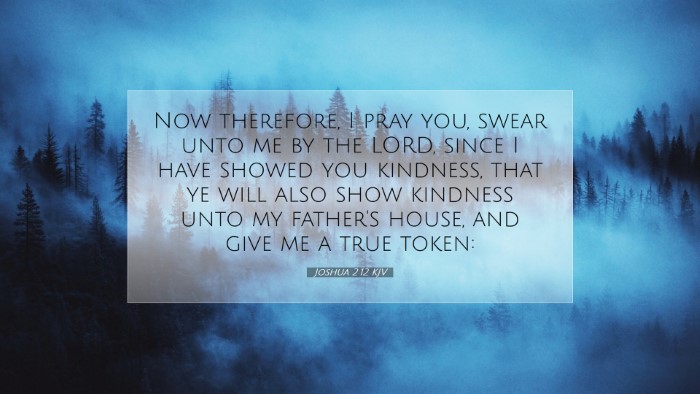Old Testament
Genesis Exodus Leviticus Numbers Deuteronomy Joshua Judges Ruth 1 Samuel 2 Samuel 1 Kings 2 Kings 1 Chronicles 2 Chronicles Ezra Nehemiah Esther Job Psalms Proverbs Ecclesiastes Song of Solomon Isaiah Jeremiah Lamentations Ezekiel Daniel Hosea Joel Amos Obadiah Jonah Micah Nahum Habakkuk Zephaniah Haggai Zechariah MalachiJoshua 2:12
Joshua 2:12 KJV
Now therefore, I pray you, swear unto me by the LORD, since I have showed you kindness, that ye will also show kindness unto my father's house, and give me a true token:
Joshua 2:12 Bible Commentary
Bible Commentary on Joshua 2:12
Joshua 2:12 states: "Now therefore, I pray you, swear unto me by the Lord, since I have shewed you kindness, that ye will also shew kindness unto my father's house, and give me a true token."
This verse encapsulates the plea of Rahab, a crucial character in the narrative of Israel's entry into the Promised Land. Her request reflects themes of covenant, loyalty, and divine providence.
Contextual Overview
The context of Joshua 2 reveals the Israelite spies sent to Jericho to scout the land before the conquest. Rahab, a harlot, hides the spies from the king's men, demonstrating her boldness and faith. Her request for a token of protection for her family is pivotal, as it showcases her understanding of the unfolding events and her desire for mercy in light of impending judgment.
Theological Implications
Theologically, Rahab represents a bridge between faith and action. Her words in Joshua 2:12 provide significant insights for pastors and theologians examining the nature of faith, mercy, and the fulfillment of God's promises.
Faith and Action
Rahab’s plea embodies the principle that genuine faith often compels action. By hiding the spies, she acted on her belief in the God of Israel. Matthew Henry, in his commentary, emphasizes the necessity of faith being accompanied by works, noting that Rahab's actions were a manifestation of her faith in the God of Israel, leading to her longing for a sign of protection for her family.
Covenant Relationships
The request for a "true token" reflects a strong awareness of covenantal relationships. Albert Barnes elucidates that Rahab’s appeal was rooted in her own act of kindness—hiding the spies—and demonstrates a profound understanding of reciprocity in relationships. This aspect resonates deeply within the Christian doctrine of love and commitment, spotlighting the need for believers to engage in covenantal promises, akin to the New Covenant established through Christ.
Divine Mercy and Providence
Rahab’s request highlights the overarching theme of divine mercy. Adam Clarke notes the significance of Rahab's plea as an intercessory act for her family, illustrating how one person's faith can extend divine mercy to others. Pastors can reflect on this when addressing congregations about the importance of prayer and intercession, emphasizing that our faith can invoke God’s mercy in the lives of others.
Practical Applications
- Faith in Action: Encourage congregants to act on their faith as Rahab did—by seeking opportunities to serve and demonstrate kindness, even in difficult situations.
- Covenantal Responsibilities: Remind Christians of their obligations within the love of Christ, emphasizing the importance of loyalty and commitment to one another.
- Intercession for Others: Highlight the importance of prayer and intercession in the life of a believer, taking Rahab as an example of how one person's faith can impact many.
Conclusion
Joshua 2:12 serves as a profound reminder of the complexities of faith, the dynamics of interpersonal kindness, and the overarching narrative of God’s mercy. Through this episode in Rahab’s life, modern believers are compelled to reflect on their own faith journeys, the ways they can act in faith, and how they might cultivate a spirit of kindness and intercession within their communities. The commentary insights of Henry, Barnes, and Clarke collectively underscore the significance of this verse, offering a rich foundation for further exploration and application within the Christian walk.


